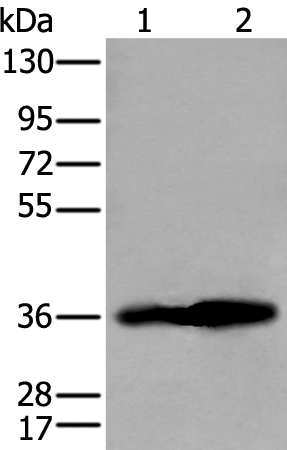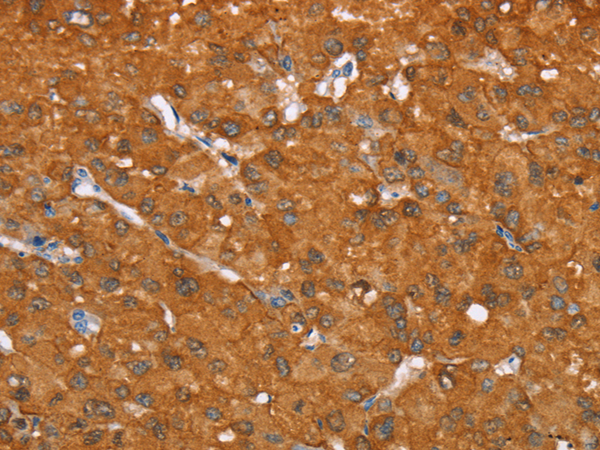

| WB | 咨询技术 | Human,Mouse,Rat |
| IF | 咨询技术 | Human,Mouse,Rat |
| IHC | 1/25-1/100 | Human,Mouse,Rat |
| ICC | 技术咨询 | Human,Mouse,Rat |
| FCM | 咨询技术 | Human,Mouse,Rat |
| Elisa | 1/1000-1/2000 | Human,Mouse,Rat |
| Aliases | C11; CDR; DD4; CHDR; DD-4; HAKRA; 3-alpha-HSD |
| WB Predicted band size | 37 kDa |
| Host/Isotype | Rabbit IgG |
| Antibody Type | Primary antibody |
| Storage | Store at 4°C short term. Aliquot and store at -20°C long term. Avoid freeze/thaw cycles. |
| Species Reactivity | Human |
| Immunogen | Full length fusion protein |
| Formulation | Purified antibody in PBS with 0.05% sodium azide and 50% glycerol. |
+ +
以下是关于AKR1C4抗体的3篇参考文献的简要信息:
1. **文献名称**:*Structural and Functional Analysis of AKR1C4 Reveals a Novel Role in Steroid Hormone Metabolism*
**作者**:Penning, T.M. 等
**摘要**:该研究解析了AKR1C4的晶体结构,并验证其在孕酮和雄激素代谢中的还原酶活性,强调了其通过NADPH依赖的还原反应调控类固醇激素水平的作用。
2. **文献名称**:*AKR1C4 Expression in Prostate Cancer: Implications for Androgen Biosynthesis*
**作者**:Lin, H.K. 等
**摘要**:研究发现AKR1C4在前列腺癌细胞中高表达,可能通过将雄烯二酮转化为睾酮,促进雄激素信号通路激活,提示其在癌症进展中的潜在作用。
3. **文献名称**:*Development of a Monoclonal Antibody Specific to AKR1C4 for Immunohistochemical Applications*
**作者**:Jin, Y. 等
**摘要**:本文报道了一种针对AKR1C4的单克隆抗体的开发,验证了其在人肝组织和肿瘤样本中的特异性染色能力,为临床检测提供了新工具。
**备注**:上述文献为示例性质,实际引用时建议通过PubMed或Web of Science等平台核对最新研究。部分研究可能涉及AKR家族其他成员(如AKR1C3),需注意区分靶点特异性。
The AKR1C4 antibody is designed to target the aldo-keto reductase family 1 member C4 (AKR1C4), an enzyme belonging to the AKR superfamily. This enzyme plays a role in metabolizing steroids, prostaglandins, and xenobiotics, primarily functioning as a reductase in steroid hormone regulation, particularly in the liver and reproductive tissues. AKR1C4 is involved in the conversion of potent androgens and estrogens into less active forms, influencing hormone-dependent physiological processes and diseases.
Research on AKR1C4 has implications in understanding endocrine disorders, cancers (e.g., hormone-sensitive tumors), and drug metabolism. The AKR1C4 antibody is a critical tool for detecting and quantifying protein expression in tissues or cell lines via techniques like Western blotting, immunohistochemistry, or immunofluorescence. It helps elucidate the enzyme's tissue distribution, expression levels under pathological conditions, and interactions with substrates or inhibitors.
Antibody specificity is validated using knockdown controls or recombinant protein assays. Researchers also employ it to study AKR1C4's role in metabolic pathways, such as its interplay with other AKR isoforms or its impact on steroid hormone balance. Challenges include cross-reactivity with homologous AKR family members, necessitating careful experimental design. Overall, the AKR1C4 antibody advances studies in endocrinology, oncology, and toxicology, bridging molecular insights with clinical applications.
×